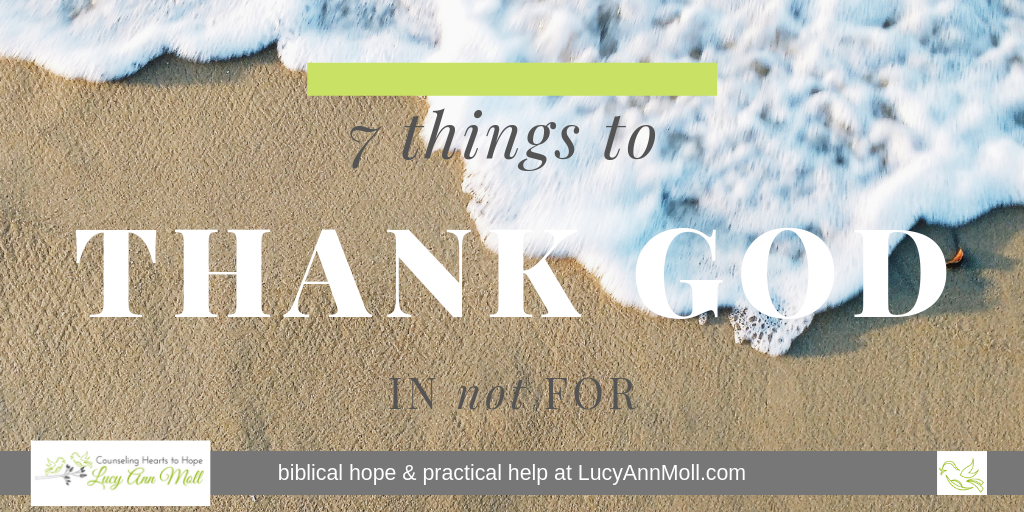
by Lucy | Aug 19, 2019 | biblical counseling, emotions, relationships
True happiness! Did you know that God made your brain in such a way that you can have this true happiness every day?
Many believers are taught that God wants us to be holy but not happy and that joy and happiness are fundamentally different. We’ve even been left with the impression that God himself isn’t happpy. Yet nothing could be further from the truth!
So says Christian author Randy Alcorn in his book Happiness.
If you’d like true happiness, consider these three parts of getting from where you’re at to where God wants you to be.
- Your thoughts make THE difference.
- Creating your own on-going happiness.
- Take the 3-minute focus challenge.
As you think healthy, godly thoughts, these new positive thoughts rewire your brain. Over time as they are repeated, your new thoughts become automatic positive thoughts that replace your old automatic negative thoughts. As your thoughts change so do your emotions. By the way, my popular “Transform Your Thoughts e-Journal” helps you learn to change your thoughts resulting in improved, godly emotions. Get it here.
Your thoughts make THE difference
Late last century, scientists began proving what God knew all along:
What you think every moment of every day deeply affects you.
Your mind is designed to control the body. Not the other way around.
While you and I cannot control the circumstances of life, we can control our response.
Neuroscientific research underscores the truth of this verse:
As a man thinks, so is he.” Proverbs 23:7
Crazy as it may sound, your thought life may contribute to 75 to 98 percent of mental, physical, and behavioral illness, says Dr. Caroline Leaf, a specialist in traumatic brain injuries and learning disabilities, and author of several books including Switch on Your Brain (Baker Books, 2013). Our bodies and minds are always interacting. One affects the other.
Our Great Physician has a remedy. Call it the 4:8 prescription, if you like.
Finally, brothers and sisters, whatever is true, whatever is noble,
whatever is right, whatever is pure, whatever is lovely, whatever is admirable
—if anything is excellent or praiseworthy—think about such things.
Philippians 4:8
True, noble, right, pure, lovely, admirable, excellent, praiseworthy — this is where God wants your focus. And isn’t God alone truly praiseworthy?
Creating On-Going Happiness
 As you think about “such things,” you experience a peace and contentment, which the average Joanne describes as happiness. In his letter to his like-minded Christians in Philippi, the apostle Paul said, “Whatever you have learned or received or heard from me, or seen in me—put it into practice. And the God of peace will be with you.” He encouraged them to follow his path to peace and contentment.
As you think about “such things,” you experience a peace and contentment, which the average Joanne describes as happiness. In his letter to his like-minded Christians in Philippi, the apostle Paul said, “Whatever you have learned or received or heard from me, or seen in me—put it into practice. And the God of peace will be with you.” He encouraged them to follow his path to peace and contentment.
More great news: You can observe your thoughts and make decisions about them! Yes, you can become aware of what you’re thinking and choose healthy thoughts leading to happiness. As one friend likes to say: Respond thoughtfully, don’t react emotionally.
Click & Tweet!
Make no mistake. A happy life of contentment isn’t comfort. Choosing Jesus first is outrageously uncomfortable yet always the pathway to true happiness.
Click & Tweet!
CHALLENGE: 3-Minute Thought Focus
Important to a happy life of contentment in Christ is tuning in to your negative self-talk so you can identify it as decrepit. Then you change it to positive inner thoughts. Here are three steps
First do this:
- Find a quiet place to sit, and take two or three deep breaths. Feel your body begin to relax.
- For a minute or two minutes, tune in to your self-talk. What are you saying to yourself? Jot down a few of your thoughts.
Now do this:
- Ask yourself, Is my thought negative?
- Then ask, What positive 4:8 thought can replace this negative thought? Write it down.
EXAMPLE:
Negative thought: “My boss is a jerk. She says I can’t do anything right!”
4:8 thought: “I choose to work hard even though my boss is inconsiderate. I know God is with me and gives me wisdom in handling this work relationship, so I trust him.”
During the rest of the day:
Every time you have the negative job thought, replace it with the positive 4:8 thought.
Happy on Repeat!
As you replace your negative thought with the new positive, God-honoring thought, your brain makes new neural pathways, researchers have found. Just think–by improving the environment of your inner thought life, you’ll experience peace, contentment, and, yes, happiness.
If you need help with this, let me know. I’ve been counseling women and families by the effective, comforting promises and truth of the Bible since 2008 by online video worldwide.

by Lucy | Aug 12, 2019 | emotions, whole health wellness |
Have you ever had a time when everyday stress overwhelmed you? Everyday stress is an emotional or mental strain that can happen to anyone but isn’t life altering like witnessing a mass shooting or receiving a cancer diagnosis. As I share my own everyday stress story, let’s remember the comforting truth that God promises to stick with us.
God’s your safe place. Always.
Click & Tweet!
That said, we also need biblical solutions for handling the anxiety that comes with everyday stress. I’m sharing three of my best stress smashers. With the help of God’s word, we all can regain the peace the soul desperately desires … even when our circumstances do not change.
Click & Tweet!
This everyday stress was a surprise
Mine began as many bad things do — with no warning. A while back, I skipped several days of exercise. Feeling guilty for eating too many cookies and skipping workouts, I decided to exercise for ten minutes in my living room.
First I stretched. Then I did sit-ups. But …
rather than doing my usual crunches — which, in retrospect, I SHOULD HAVE DONE — I tucked my feet under the couch, laid on back, and rolled all the up to sitting and back down. On sit-up numero ocho, something in my back didn’t feel right. Nonetheless, I pressed on and completed two more full sit-ups, far short of my goal. I rubbed my back and called it a day — and didn’t think much of my situps
until the next morning
when I awoke to an intense clenching in my lower back muscles and numbness in my legs. I elbowed my snoozing husband.
Steve, something’s wrong. I need your help. Steve, wake up. I need you.
He heard fear in my voice, listened to my story of super-tight back muscles, and got me a pain reliever. He assured me, “You should be better in a few days. Just rest. We’ll take care of the house stuff. Don’t worry.”
Then it got worse
My family cooked, laundered, and swept while I was laid up and my kitty curled next to me. I began to feel a bit better, but then I learned that a close family member needed daily injections. Nothing life threatening, but important and another thing to deal with
while my back continued to spasm and the numbness in my legs lingered.
I remember thinking and praying, “God, the doctor said I should be better in four to eight weeks. I’m not. Walking and standing hurts, and my legs and feet feel bubble-wrapped, and now a family member is hurting. Help us.”
And worse
Things seems to happen in threes, right? Another family member received bad health new. So I prayed again.
And again. More intensely. Desperately. I remembered this quote:
God whispers to us in our pleasures. He speaks to us in our conscience, but He shouts to us in our pain. It is His megaphone to rouse a deaf world. –C.S. Lewis
God had my attention. Soon, fear accompanied the pain. And my thoughts turned inward and became increasingly negative.
Will the doctors have a treatment that works?
Has God forgotten me? Is He punishing me? Does He care?
It turned out that my back got better after physical therapy. I continue to do the exercises to this day. As God providentially worked in my circumstance to bring healing, I learned at least three strategies to smash everyday stress.
3 Strategies for Handling Everyday Stress
We face everyday stresses of all sorts every day: unexpected bills, car problems, an argument with a loved one, traffic. Our reactions to these stresses reveal what’s in our heart (or, our true inner person). For instance, when stressed, we may become angry and lash out, or anxious and worry, or sad and mope. Scripture says,
No temptation has overtaken you that is not common to man. God is faithful, and he will not let you be tempted beyond your ability, but with the temptation he will also provide a way of escape, that you may be able to endure it (1 Cor. 10:13).
Here are three ways to handle stress anxiety by learning to trust God.
1. Agree with God
Agree with God that he cares about you, is with you, and is more concerned with conforming you to the image of his Son, Jesus, than making your everyday stress vanish like the wind. We live in a fallen world with all sorts of troubles.
REFLECT: What troubles are you facing now? Will you agree with God that He has a purpose for your problems?
2. Accept Your Situation (and improve it, if you can)
Give thanks to God in all circumstances; for this is the will of Christ Jesus for you.
What this verse is saying is the proper response to everyday stress is thanksgiving because we recognize that He is supremely in control of whatever comes your way for your good and his glory. We accept our situation as God’s good plan, thanking Him for how he is using it to transform us. Yet, if we can improve our circumstance, we often should.
Didn’t David kill Goliath when the giant taunted the Israelites? The men who spied out Jericho found a place to hide at Rahab’s home, right? And Jesus often slipped through the crowds who wanted to detain him. I sought help from a doctor, physical therapists, and medication.
ACTION: An excellent way to give thanks in all circumstances is keeping a list of reason to give thanks to God and adding to it daily.
3. Affirm the Truth
As your mind and your thinking are renewed by the Word of God, you gain a godly perspective of your everyday stress anxiety and are able to discern God’s will. Read Romans 12:2 carefully. Take time to meditate (or think carefully) about each phrase. Commit it to memory. Then consider what passages such as Psalm 23 and Romans 8:28-39 say about God. Ask yourself, What do these verses reveal about the character of God and His heart toward his children?
THINK: In light of God’s character and His loving-kindness toward us, how might we regain the peace that the soul desperately desires when we face everyday stresses?
Are you in the midst of S-T-R-E-S-S now? Need help?
Click & Tweet!
As a biblical counselor certified by ACBC who has counseled women and families worldwide by Skype, FaceTime, and Zoom, I invite you to look over my articles and to contact me with your questions.


by Lucy | Aug 6, 2019 | biblical counseling, relationships |
My in-laws are in their 80s and slowing down, but don’t have dementia. Maybe they’ll develop this memory cognitive disorder. Maybe they won’t.
But I have had the opportunity of counseling folks whose loved ones have these life-stealing, memory-dimming cognitive disorder. And the church needs to be ready.
Click & Tweet!
Yesterday. My article appeared first here at The Biblical Counseling Coalition and is used with permission.
How is your church helping the caregivers of dementia sufferers?

When you hear the word dementia, what first pops into your mind? Old age? Alzheimer’s? Nursing homes? The high cost of care? No one likes to talk about dementia. Nobody wants to have dementia. Still, biblical counselors need to know about it because chances are they will counsel a person with dementia or, more likely, family members who provide care.
In brief, dementia is a cognitive disorder. The affected person’s thinking ability gradually deteriorates. It interferes with judgment and memory and also can create confusion, fear, and irritation.
There are several types of dementia. The best known is Alzheimer’s, which was experienced by former president Ronald Reagan.
Dementia Statistics
In 1900, people aged 65 or older made up 4 percent of the U.S. population. In 1980, this number nearly tripled to11 percent of the population. Do you know the estimate for the year 2030? 22 percent – almost a quarter of the population![1] And the “geriatric” slice of pie keeps growing.
Obviously, not every person aged 65 and older develops dementia (like my parents and in-laws). In fact, researchers found that just over 1 percent of those from 65 to 74 have this cognitive disorder. The percentage jumps to nearly 4 percent for ages 75 to 84 and rises to about 10 percent of folks over 85.
However, some researchers estimate that dementia of the Alzheimer’s type may affect nearly half of those at the older end of this spectrum.
Secular Understanding of Dementia
The secular term for dementia in the DSM-5 is “neurocognitive disorder” that progressively worsens. It is specified by severity. A person with a “mild” case needs help with some activities of daily living, such as housework. A person with a “moderate” case needs help with basics like dressing and eating. And a person with a “severe” case is fully dependent on others for almost everything.
Consider Hank. At age 66, he took a job as a greeter at a big box store. He was a retired accountant and a smart guy. When he started as a greeter, he memorized the locations of many of the items in the store so he could direct customers. But nearly a year into the job, his memory noticeably slipped. His solution? To write information in a small notebook to help him remember things. But then he began forgetting to shave and to get to work on time.
His daughter brought him to a doctor for an evaluation of his cognitive ability. Using the Medical Model, the doctor ordered tests including a blood workup and an MRI, and they ruled out illnesses and conditions other than what his daughter feared most: major neurocognitive disorder due to possible Alzheimer’s disease.
In the Medical Model, a doctor might prescribe an antidepressant for his mild depression and recommend ongoing care in a nursing home.

A Biblical Approach for Dementia
Like the secular Medical Model, the biblical approach has a standard definition of dementia: decreased mental capabilities such as memory loss, inability to think abstractly, impaired decision-making, and the inability to communicate normally. The biblical approach values the contributions of physicians and considers dementia a medical condition that should be managed by a physician.[2]
In addition, the biblical approach recognizes that people with dementia and their loved ones need counseling based on biblical truth. A biblical counselor is advised to take a personal interest in a counselee with dementia and visit frequently, be sensitive to spiritual needs, and encourage him or her from Scripture.
Many Christian families may choose to care for their loved one at home rather than send them to a nursing home, if possible. We see an application of this in 1 Timothy 2:3-16, a passage that focuses on the treatment of widows. The apostle Paul says that widows first need to provide for themselves or remarry. If this isn’t possible, then the family is to help.
Finally, if the family is unable to help, then the church would provide for her needs including proper housing, clothing, and food.
“Thank You”
In his book The Art of Aging, Dr. Howard Eyrich shares an account of how their family cared for his father in their home.[3] Diagnosed with Alzheimer’s disease, he developed a negative attitude and everything needed to be done for him – dressing, eating, and eventually toileting. Much of this care was done by his daughter-in-law, who was “on call” nearly all day every day except for those times they arranged for someone to come in.
Eyrich fondly remembers an encouraging incident before his father’s death. His father told him, “Kid, I’d be in an awful fix if it weren’t for you. Thank you.” Then a blank stare returned to his eyes.
Tending Caregivers
The wise biblical counselor also pays attention to the caregiver(s), helping them choose to believe the Word of God and apply it to their lives, no matter how they feel in the trial of dementia. Part of this includes planning, preparation, and team meetings among the family members who are providing care. Where will the loved one with dementia live? Does someone need to quit employment to provide care? And so on.
Also, a biblical counselor would demonstrate love to the family by helping to ensure that the family’s church provides emotional support and also meets physical needs. One physical need that a family will have is time to take a break. Another need might be meals delivered to the home. Still, another is for someone to fill in for the caregiver so that he or she may attend church.
The caregiver(s) too need personal biblical counseling as they consider their own heart and responses to the trial of dementia. Emotions like anger, fear, and sadness are common. It’s important that the church’s response is organized and methodical. Otherwise, the family may be forgotten and neglected.
Just Because You Can, Doesn’t Mean You Should
One last note: The biblical approach recognizes that just because a family is willing to care for a loved one with dementia, this doesn’t mean the family should. As a biblical counselor helps family members work through these crucial questions, they may choose a suitable alternative. These might include adult daycare, hiring in-home care, or even a nursing home – all of which are costly.
Caring for a loved one with dementia doesn’t have to be a negative experience, although there will be negative experiences along the way. The Lord will enhance growth in Christlikeness as His children glorify God in thought and deed.
Questions for Reflection
Have you counseled caregivers of those experiencing dementia? How can you come alongside families like these to provide physical and emotional support?
[1] Howard Eyrich and Judy Dabler, The Art of Aging: A Christian Handbook (Bemidji, MN: Focus Publishing, 2006), 112. [2] Marshall Asher and Mary Asher, The Christian’s Guide to Psychological Terms, Second Edition (Bemidji, MN: Focus Publishing, 2014), 57. [3] Eyrich, The Art of Aging, 75.

by Lucy | Jul 3, 2019 | emotions, identity in Christ, People Who Hurt, thoughts
My funk came out of nowhere and I forgot to thank God. Not for the funk. That would be insane, right? But in the craziness of normal life.
Example 1: I sent my water bill payment to the electricity company, and the water company threatened to turn off my H2O.
Example 2: My cat tossed his cookies. And she boot-scooted, drawing criss-cross lines on the carpet. I’ll spare you a visual.
Example 3: Okay, this next one isn’t crazy but super stressful.
My college-age son, who lives 1,200 miles away, had to find a new place to stay fast. So I worried, and when I worry, I wake up a million times during the night, covers off, covers on, covers off. Not only that, my back tightens and my feet go all numb-y. Then I dwell on The Injury. And I fear a repeat.
Don’t Do What I Did
In the middle of my funk I focused on me. I failed to think about the all-powerful God who has my back. And I forgot to thank God.
But thanking God is his will!
Many times when I counsel hurting women they ask about God’s will for their lives, and we have rich conversations. I listen to their life story in the light of God’s redemptive plan for them. And it becomes clearer — God’s will.
Annie’s husband just lost his job. And she’s concerned but hopeful. Her husband’s a good guy, a harder worker, an amazing dad to their three kiddos. But now they don’t have health insurance. And the youngest needs physical therapy. And so she worried.
We opened to this snippet of Scripture:
give thanks in all circumstances; for this is the will of God in Christ Jesus for you. 2 Thessalonians 5:18
There it is. Thank God.
Click & Tweet!
Instead, Thank God
Often I give a “thank God” assignment to counselees. For 20 minutes, they list everything going on in life: the vacation to Hawaii, a costly car repair, a kid’s high school graduation, a husband’s lost job, and so on. You’ll note “good” and “bad” stuff on the list.
Then we give thanks.
Lucy, are you nuts? How could anyone possibly thank God for the bad stuff, right?
Click & Tweet!
But God says give thanks in all circumstances. In is not for. Really, who thanks God for cat barf and boot scoots? As we thank God in all circumstances, we recognize he’s is in control and knows exactly what we face. He is with us, in us. Thanking God becomes worship.
Click & Tweet!
When Annie made her list and thanked God in her circumstances, her focus shifted from self to God and her worry disappeared.
My 7 Things (plus one)
Now let’s give it a go. List everything happening in life. I’ll share the first 7 that come to mind.
- The pistachios I ate for lunch.
- My messy desk.
- Birds tweeting.
- My daughter’s MS (yes, that).
- Books!!!
- Wednesday nights studying Revelation with 20 others.
- Friends all over America but none near me in my new town.
- BONUS: My husband — I really don’t deserve him.
As expected, when I wrote my list, my spirit lifted. Remembering God for the little things, even the hard things, helped put my circumstances in perspective, and thank him. I entered into worship.
May I encourage you to set your timer to 20 minutes and list everything going on in your life? You’ll probably get stuck 5 minutes in. This is normal. Don’t give up. Keep going. Then thank God in all circumstances.
Let me know how it goes.


by Lucy | Jun 5, 2019 | biblical counseling, Counselor Resources
Moral relativism — it defines topsy-turvy postmodern culture and is coming to a counseling room near you. How might a counselor think compassionately about such things? This article appeared first here at The Biblical Counseling Coalition.

Remember the blind men and the elephant? Six blind sojourners come across different parts of an elephant in their life journeys and each, in turn, creates his own version of reality based on his experience. One proclaims the elephant is a wall, another says it’s a snake, another a spear, and so forth.
This illustration is the poster child of moral relativism, which insists that “what’s right for me is my truth.” It asserts that personal truth is the highest form of truth. Moral relativism dominates our culture and has likely barged into your counseling office, as it has mine, noisily demanding that one must “live their truth.”
Moral Relativism Is Old News
It reaches back to the Garden. The smooth-talking serpent questioned the Truth-giver’s truth—that Adam and Eve may eat from all the trees but one, or “you shall surely die” (Gen. 2:17)—and the first couple gobbled Satan’s lie.
Adam’s new not-true “truth” sent him running and hiding and blaming. “I heard the sound of you in the garden, and I was afraid, because I was naked, and I hid myself” (Gen. 3:10). He hid because of the shame of his sin of disobedience. Then he compounded his lie in blaming the woman, who in turn blamed the serpent.
God hates lying. Proverbs 12:22 declares:
“Lying lips are an abomination to the LORD, but those who act faithfully are his delight.”
Its opposite is truth, of course. God determines the truth. Not me, not you, and not our counselees.
Moral Relativism in Modernity
Back in the ‘70s, I believed the lie of moral relativism packaged as a pro-choice argument. I admit this with great embarrassment. My friend Ellen was “with child,” thanks to her college boyfriend, a condom failure, and her belief that sex before marriage was “just fine, thank you.”
The good Catholic girl that I was, I thought abortion was wrong, and “I’d never get one,” but “if it’s right for you, then that’s your choice,” and thus I supported her decision. A mutual friend and I checked out the abortion clinic with the Better Business Bureau before she went because we cared about her.
And the baby? What baby? We all tried to forget. Moral relativism had won.
Now let’s zip to today and survey the cultural landscape: drag kids, transgenderism, an alphabet soup of gender “expressions” (whatever that means), pedophilia disguised as man-boy love, and of course abortion on demand through all the months of pregnancy. And when abortion “fails,” infanticide.
Moral Relativism in the Counseling Office
A little while back, the parents of a teen girl named “Kaylee” wanted me to talk with her about her older brother’s decision to transition to be “a female.” He had begun hormone therapy and was considering radical surgery to remove his genitalia. There was also talk of breast implants.
Equally confusing, my counselee’s brother was dating a bisexual. A man transitioning to a woman was dating a guy who admitted to liking men and women. Weird, right? Yet my counselee took it in stride. “She’s happier now,” Kaylee remarked, using the appropriate progressive pronoun. “She’s who she wants to be, who she’s meant to be.”
The parents professed Christianity as did Kaylee. The mom wasn’t outwardly upset over their son, but the dad seemed embarrassed and said so. Their concern now was making sure Kaylee was fine with their family’s new not-true truth while also admitting they walked a road where up is down and right is wrong.
Not surprisingly, when Kaylee and I read Scripture verses and discussed their meaning, she—like many counselees—was quick to say, “What this means to me is ….” That little prepositional phrase “to me” is a sign of our moral relativistic times and a bane to Bible study.
An Important Place to Reclaim Truth
As we open our Bibles and read Scripture, there may be no better place to reclaim truth in the counseling office than proper Bible study. Today’s prevailing cultural message to “live your truth” is demanding and noisy and a lie. It lures people, including Christians, to live whatever way feels right to them (Prov. 14:12).
But historical-grammatical Bible study provides a process to understand a text as God intended, protecting us from falling into error. Many excellent volumes have been written on how to study the Bible. I encourage you to ask your pastor or a spiritually mature Christian friend for recommendations. One of the many excellent resources is John MacArthur’s How to Study the Bible (Chicago: Moody, 2009).
Along these lines, let us start with three primary questions we can encourage our counselees to ask as they read a passage of Scripture:
- What does it say? (Not what does it say to me.)
- What does it mean? (Not what does it mean to me.)
- How should it change me? Here, the “me” is spot on and we might follow it up with these additional questions:
- What does this passage teach me about God?
- How does this aspect of God’s character change my view of self?
- What should I do in response?
Moral relativism is our culture’s precious grandchild now. It gets a pat on the head and sugar for supper. It demands its way like 2-year-old. And it barges into the counseling room. So how might you quiet it? Feed your counselee Truth.
Questions for Reflection
Which Bible study process helps your counselees have a correct understanding, interpretation, and application of Scripture?
Describe a time when you saw moral relativism play out in the counseling office, classroom, or church lobby. What was your response?
How are you guarding yourself and your family in today’s moral relativistic times?


 As you think about “such things,” you experience a peace and contentment, which the average Joanne describes as happiness. In his letter to his like-minded Christians in Philippi, the apostle Paul said, “Whatever you have learned or received or heard from me, or seen in me—put it into practice. And the God of peace will be with you.” He encouraged them to follow his path to peace and contentment.
As you think about “such things,” you experience a peace and contentment, which the average Joanne describes as happiness. In his letter to his like-minded Christians in Philippi, the apostle Paul said, “Whatever you have learned or received or heard from me, or seen in me—put it into practice. And the God of peace will be with you.” He encouraged them to follow his path to peace and contentment.










